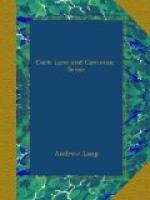The Amiens case (1746) is reported and attested by Father Charles Louis Richard, Professor in Theology, a Dominican friar. The haunted house was in the Rue de l’Aventure, parish of St. Jacques. The tenant was a M. Leleu, aged thirty-six. The troubles had lasted for fourteen years, and there was evidence for their occurrence earlier, before Leleu occupied the house. The disturbances were of the usual kind, a sound of heavy planks being tossed about, as in the experience of Scott at Abbotsford, raps, the fastening of doors so that they could not be opened for long, and then suddenly gave way (this, also, is frequent in modern tales), a sound of sweeping the floor, as in the Epworth case, in the Wesleys’ parsonage, heavy knocks and thumps, the dragging of heavy bodies, steps on the stairs, lights, the dancing of all the furniture in the room of Mlle. Marie de Latre, rattling of crockery, a noise of whirring in the air, a jingling as of coins (familiar at Epworth), and, briefly, all the usually reported tintamarre. Twenty persons, priests, women, girls, men of all sorts, attest those phenomena which are simply the ordinary occurrences still alleged to be prevalent.
The narrator believes in diabolical agency, but he gives the explanations of common-sense. 1. M. Leleu is a visionary. But, as no one says that all the other witnesses are visionaries, this helps us little. 2. M. Leleu makes all the noise himself. That is, he climbs to the roof with a heavy sack of grain on his shoulder, and lets it fall; he runs up and down the chimneys with his heavy sack on his shoulder, he frolics with weighty planks all over the house, thumps the walls, makes furniture dance, and how? What is his motive? His tenants leave him, he is called a fool, a devil, a possessed person: his business is threatened, they talk of putting him in jail, and that is all he has got by his partiality for making a racket. 3. The neighbours make the noises, and again the narrator asks ‘how?’ and ‘why?’ 4. Some priests slept in the house once and heard nothing. But nobody pretends that there is always something to hear. The Bishop of Amiens licenses the publication ’with the more confidence, as we have ourselves received the depositions of ten witnesses, a number more than sufficient to attest a fact which nobody has any interest in feigning’.
In a tale like this, which is only one out of a vast number, exactly analogous, Common-sense is ill-advised in simply alleging imposture, so long maintained, so motiveless, and, on the whole, so very difficult to execute. M. Leleu brought in the Church, with its exorcisms, but our Dominican authority does not say whether or not the noises ceased after the rites had been performed. Dufresnoy, in whose Dissertations {178} these documents are republished, mentions that Bouchel, in his Bibliotheque du Droit Francois, d. v. ‘Louage,’ treats of the legal aspect of haunted houses. Thus the profession has not wholly disdained the inquiry.




